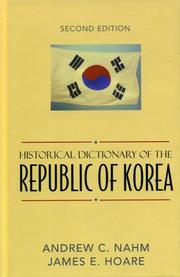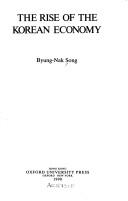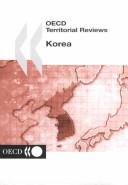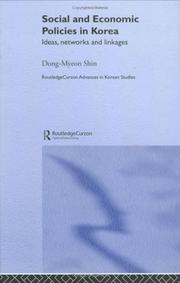| Listing 1 - 10 of 109 | << page >> |
Sort by
|
Book
ISBN: 0585019088 9780585019086 1438406967 Year: 1985 Publisher: Albany : State University of New York Press,
Abstract | Keywords | Export | Availability | Bookmark
 Loading...
Loading...Choose an application
- Reference Manager
- EndNote
- RefWorks (Direct export to RefWorks)
English --- American Literature --- Languages & Literatures --- Korea (South) --- USAMGIK --- United States Army Military Government in Korea --- Taehan Minʼguk --- Han guo --- Dae Han Min Kuk --- Tae Han Min Guk --- Daehan-Minʼguk --- South Korea --- Tai Han Min Kook --- South Korean Interim Government --- S.K.I.G. --- SKIG --- Nam Chosŏn Kwado Chŏngbu --- Namjosŏn --- Namjosŏn Kwado Chŏngbu --- Republic of Korea --- Da Han Minguo --- Daehan Min-kuk --- Daikan Minkoku --- ROK --- 대한민국 --- 大韓民國 --- 대한 민국 --- Daehanminguk --- History --- Ȯmnȯd Solongos --- Emu̇nedu̇ Solungus --- Solongos (South) --- Solungus (South) --- Bu̇gd Naĭramdakh Solongos Uls --- Bu̇gu̇de Nayiramdaqu Solungus Ulus --- I︠U︡zhnai︠a︡ Korei︠a︡ --- Южная Корея --- Korei︠a︡ (South) --- Корея (South) --- BNSU --- БНСУ
Book
ISBN: 9004315756 9004315748 Year: 2016 Publisher: Leiden ; Boston : Brill,
Abstract | Keywords | Export | Availability | Bookmark
 Loading...
Loading...Choose an application
- Reference Manager
- EndNote
- RefWorks (Direct export to RefWorks)
The Republic of Korea was colonialized in the early 20th century, achieved its independence, and rose from the ashes of the Korean War to become an Asian power. Korea’s ascent coincides neatly with the advent of globalization and growing importance of international law in managing the increasing interactions between states and other non-state entities such as multinational corporations, non-governmental organizations, and international organizations like the United Nations. The Making of International Law in Korea addresses the developments of international law in Korea from human rights concerns to law of the sea issues; from maritime delimitation and access to ocean resources to other non-security matters. Offered as a textbook for academics and students, the authors demonstrate the increasingly important role of international law in shaping international relations in Northeast Asia and Korea.
Korea (South) --- USAMGIK --- United States Army Military Government in Korea --- Taehan Minʼguk --- Han guo --- Dae Han Min Kuk --- Tae Han Min Guk --- Daehan-Minʼguk --- South Korea --- Tai Han Min Kook --- South Korean Interim Government --- S.K.I.G. --- SKIG --- Nam Chosŏn Kwado Chŏngbu --- Namjosŏn --- Namjosŏn Kwado Chŏngbu --- Republic of Korea --- Da Han Minguo --- Daehan Min-kuk --- Daikan Minkoku --- ROK --- 대한민국 --- 大韓民國 --- 대한 민국 --- Daehanminguk --- International status. --- Ȯmnȯd Solongos --- Emu̇nedu̇ Solungus --- Solongos (South) --- Solungus (South) --- Bu̇gd Naĭramdakh Solongos Uls --- Bu̇gu̇de Nayiramdaqu Solungus Ulus --- I︠U︡zhnai︠a︡ Korei︠a︡ --- Южная Корея --- Korei︠a︡ (South) --- Корея (South) --- BNSU --- БНСУ
Book
ISBN: 9062555136 Year: 1983 Publisher: Zutphen Terra
Abstract | Keywords | Export | Availability | Bookmark
 Loading...
Loading...Choose an application
- Reference Manager
- EndNote
- RefWorks (Direct export to RefWorks)
Regional documentation --- South Korea --- KR / South Korea - Zuid Korea - Corée du Sud --- 37 --- K9000 --- K9200 --- 308 <519.5> --- Geografische economie. Monografieën van streken en landen. --- Korea: General works and series --- Korea: Geography and local history -- united and South Korea --- Korea (South) --- Geografische economie. Monografieën van streken en landen --- USAMGIK --- United States Army Military Government in Korea --- Taehan Minʼguk --- Han guo --- Dae Han Min Kuk --- Tae Han Min Guk --- Daehan-Minʼguk --- Tai Han Min Kook --- South Korean Interim Government --- S.K.I.G. --- SKIG --- Nam Chosŏn Kwado Chŏngbu --- Namjosŏn --- Namjosŏn Kwado Chŏngbu --- Republic of Korea --- Da Han Minguo --- Daehan Min-kuk --- Daikan Minkoku --- ROK --- 대한민국 --- 大韓民國 --- 대한 민국 --- Daehanminguk --- Ȯmnȯd Solongos --- Emu̇nedu̇ Solungus --- Solongos (South) --- Solungus (South) --- Bu̇gd Naĭramdakh Solongos Uls --- Bu̇gu̇de Nayiramdaqu Solungus Ulus --- I︠U︡zhnai︠a︡ Korei︠a︡ --- Южная Корея --- Korei︠a︡ (South) --- Корея (South) --- BNSU --- БНСУ

ISBN: 0810849496 9780810849495 Year: 2004 Volume: 52 Publisher: Lanham Toronto Oxford The Scarecrow Press
Abstract | Keywords | Export | Availability | Bookmark
 Loading...
Loading...Choose an application
- Reference Manager
- EndNote
- RefWorks (Direct export to RefWorks)
Korea (South) --- Korea --- History --- 908 <519> --- K9160 --- K9136 --- Heemkunde. Area studies--Korea --- Korea: History -- modern period (1860s-[1945]), 20th century general --- Korea: History -- reference works --- -Korea --- -Dictionaries. --- Taehan Minʼguk --- Han guo --- Dae Han Min Kuk --- Tae Han Min Guk --- Daehan-Minʼguk --- South Korea --- Tai Han Min Kook --- South Korean Interim Government --- S.K.I.G. --- SKIG --- Nam Chosŏn Kwado Chŏngbu --- Namjosŏn --- Namjosŏn Kwado Chŏngbu --- Republic of Korea --- Da Han Minguo --- Daehan Min-kuk --- Daikan Minkoku --- ROK --- 대한민국 --- 大韓民國 --- 대한 민국 --- Daehanminguk --- USAMGIK --- United States Army Military Government in Korea --- Korea (South) - History - Dictionaries --- Korea - History - Dictionaries --- Ȯmnȯd Solongos --- Emu̇nedu̇ Solungus --- Solongos (South) --- Solungus (South) --- Bu̇gd Naĭramdakh Solongos Uls --- Bu̇gu̇de Nayiramdaqu Solungus Ulus --- I︠U︡zhnai︠a︡ Korei︠a︡ --- Южная Корея --- Korei︠a︡ (South) --- Корея (South) --- BNSU --- БНСУ

ISBN: 8976332385 9788976332387 Year: 2003 Publisher: Seoul Samsung economic research institute
Abstract | Keywords | Export | Availability | Bookmark
 Loading...
Loading...Choose an application
- Reference Manager
- EndNote
- RefWorks (Direct export to RefWorks)
Structural adjustment (Economic policy) --- Korea (South) --- Economic policy --- Economic conditions --- K9400.80 --- Korea: Economy and industry -- history -- modern period, postwar period (1945- ) --- Taehan Minʼguk --- Han guo --- Dae Han Min Kuk --- Tae Han Min Guk --- Daehan-Minʼguk --- South Korea --- Tai Han Min Kook --- South Korean Interim Government --- S.K.I.G. --- SKIG --- Nam Chosŏn Kwado Chŏngbu --- Namjosŏn --- Namjosŏn Kwado Chŏngbu --- Republic of Korea --- Da Han Minguo --- Daehan Min-kuk --- Daikan Minkoku --- ROK --- 대한민국 --- 大韓民國 --- 대한 민국 --- Daehanminguk --- USAMGIK --- United States Army Military Government in Korea --- Structural adjustment (Economic policy) - Korea (South) --- Korea (South) - Economic policy - 1960-1988 --- Korea (South) - Economic policy - 1988 --- -Korea (South) - Economic policy - 1960-1988 --- Korea (South) - Economic conditions - 1988 --- -Korea (South) --- Ȯmnȯd Solongos --- Emu̇nedu̇ Solungus --- Solongos (South) --- Solungus (South) --- Bu̇gd Naĭramdakh Solongos Uls --- Bu̇gu̇de Nayiramdaqu Solungus Ulus --- I︠U︡zhnai︠a︡ Korei︠a︡ --- Южная Корея --- Korei︠a︡ (South) --- Корея (South) --- BNSU --- БНСУ
Book
ISBN: 8988095863 9788988095867 Year: 2005 Publisher: Seoul Jimoondang
Abstract | Keywords | Export | Availability | Bookmark
 Loading...
Loading...Choose an application
- Reference Manager
- EndNote
- RefWorks (Direct export to RefWorks)
Popular culture --- Korea (South) --- Politics and government --- History --- Civilization --- K9180 --- K9300.80 --- Korea: History -- post World War II (1945- ) --- Korea: Social sciences -- social and cultural history -- modern period, postwar period (1945- ) --- Taehan Minʼguk --- Han guo --- Dae Han Min Kuk --- Tae Han Min Guk --- Daehan-Minʼguk --- South Korea --- Tai Han Min Kook --- South Korean Interim Government --- S.K.I.G. --- SKIG --- Nam Chosŏn Kwado Chŏngbu --- Namjosŏn --- Namjosŏn Kwado Chŏngbu --- Republic of Korea --- Da Han Minguo --- Daehan Min-kuk --- Daikan Minkoku --- ROK --- 대한민국 --- 大韓民國 --- 대한 민국 --- Daehanminguk --- USAMGIK --- United States Army Military Government in Korea --- Popular culture - Korea (South) --- Korea (South) - Politics and government - 1988 --- -Korea (South) - History - 1988 --- -Korea (South) - Civilization - 21st century --- Ȯmnȯd Solongos --- Emu̇nedu̇ Solungus --- Solongos (South) --- Solungus (South) --- Bu̇gd Naĭramdakh Solongos Uls --- Bu̇gu̇de Nayiramdaqu Solungus Ulus --- I︠U︡zhnai︠a︡ Korei︠a︡ --- Южная Корея --- Korei︠a︡ (South) --- Корея (South) --- BNSU --- БНСУ

ISBN: 0195853431 019583979X 9780195853438 Year: 1992 Publisher: Hong Kong Oxford university
Abstract | Keywords | Export | Availability | Bookmark
 Loading...
Loading...Choose an application
- Reference Manager
- EndNote
- RefWorks (Direct export to RefWorks)
Korea (South) --- Economic conditions --- Economic policy --- Foreign economic relations --- K9400.80 --- Korea: Economy and industry -- history -- modern period, postwar period (1945- ) --- Taehan Minʼguk --- Han guo --- Dae Han Min Kuk --- Tae Han Min Guk --- Daehan-Minʼguk --- South Korea --- Tai Han Min Kook --- South Korean Interim Government --- S.K.I.G. --- SKIG --- Nam Chosŏn Kwado Chŏngbu --- Namjosŏn --- Namjosŏn Kwado Chŏngbu --- Republic of Korea --- Da Han Minguo --- Daehan Min-kuk --- Daikan Minkoku --- ROK --- 대한민국 --- 大韓民國 --- 대한 민국 --- Daehanminguk --- Foreign economic relations. --- USAMGIK --- United States Army Military Government in Korea --- Korea (South) - Economic conditions - 1960-1988 --- Korea (South) - Economic policy - 1960-1988 --- Korea (South) - Foreign economic relations --- Ȯmnȯd Solongos --- Emu̇nedu̇ Solungus --- Solongos (South) --- Solungus (South) --- Bu̇gd Naĭramdakh Solongos Uls --- Bu̇gu̇de Nayiramdaqu Solungus Ulus --- I︠U︡zhnai︠a︡ Korei︠a︡ --- Южная Корея --- Korei︠a︡ (South) --- Корея (South) --- BNSU --- БНСУ
Book
ISBN: 9788959390236 8959390232 Year: 2007 Publisher: Seoul Hongikmediaplus
Abstract | Keywords | Export | Availability | Bookmark
 Loading...
Loading...Choose an application
- Reference Manager
- EndNote
- RefWorks (Direct export to RefWorks)
Korea (South) --- Korea --- Civilization --- K9000 --- Korea: General works and series --- Taehan Minʼguk --- Han guo --- Dae Han Min Kuk --- Tae Han Min Guk --- Daehan-Minʼguk --- South Korea --- Tai Han Min Kook --- South Korean Interim Government --- S.K.I.G. --- SKIG --- Nam Chosŏn Kwado Chŏngbu --- Namjosŏn --- Namjosŏn Kwado Chŏngbu --- Republic of Korea --- Da Han Minguo --- Daehan Min-kuk --- Daikan Minkoku --- ROK --- 대한민국 --- 大韓民國 --- 대한 민국 --- Daehanminguk --- Civilization. --- USAMGIK --- United States Army Military Government in Korea --- Korea - Civilization --- Ȯmnȯd Solongos --- Emu̇nedu̇ Solungus --- Solongos (South) --- Solungus (South) --- Bu̇gd Naĭramdakh Solongos Uls --- Bu̇gu̇de Nayiramdaqu Solungus Ulus --- I︠U︡zhnai︠a︡ Korei︠a︡ --- Южная Корея --- Korei︠a︡ (South) --- Корея (South) --- BNSU --- БНСУ

ISBN: 1280082844 9786610082841 9264195688 9789264195684 9264196501 Year: 2001 Publisher: Paris : OECD Publishing,
Abstract | Keywords | Export | Availability | Bookmark
 Loading...
Loading...Choose an application
- Reference Manager
- EndNote
- RefWorks (Direct export to RefWorks)
OECD's territorial review of Korea. It finds that deep societal changes against the backdrop of rapid economic growth have characterised Korea in the Post-War period. Most notably, the tripling of its population has induced significant territorial transformations. Despite the effort to promote balanced regional growth, Korea is still characterised by substantial geographical polarisation. An economically dominant Capital region lodges more than 45 per cent of the country’s population, producing nearly half of its GDP. Over the past decade, policy makers have developed a comprehensive spatial perspective, they have put in place policies tackling the use of land, infrastructure and problems in lagging regions, and they have significantly restructured territorial governance. However, further action may help fully exploit the on-going efforts. Cross-sectoral co-ordination is weak and better correspondence between the overall spatial vision and financial support to individual public projects seems appropriate. Territorial governance remains centrally oriented with the result that limited local autonomy may hinder regional innovation directed to sustainable economic growth. The focus on large firms may fail in exploiting the considerable contribution of SMEs to regional development.
Land use --- Business & Economics --- Real Estate, Housing & Land Use --- Korea (South) --- Economic conditions --- Economic policy --- Land --- Land utilization --- Use of land --- Utilization of land --- Taehan Minʼguk --- Han guo --- Dae Han Min Kuk --- Tae Han Min Guk --- Daehan-Minʼguk --- South Korea --- Tai Han Min Kook --- South Korean Interim Government --- S.K.I.G. --- SKIG --- Nam Chosŏn Kwado Chŏngbu --- Namjosŏn --- Namjosŏn Kwado Chŏngbu --- Republic of Korea --- Da Han Minguo --- Daehan Min-kuk --- Daikan Minkoku --- ROK --- 대한민국 --- 大韓民國 --- 대한 민국 --- Daehanminguk --- Economics --- Land cover --- Landscape assessment --- NIMBY syndrome --- USAMGIK --- United States Army Military Government in Korea --- Ȯmnȯd Solongos --- Emu̇nedu̇ Solungus --- Solongos (South) --- Solungus (South) --- Bu̇gd Naĭramdakh Solongos Uls --- Bu̇gu̇de Nayiramdaqu Solungus Ulus --- I︠U︡zhnai︠a︡ Korei︠a︡ --- Южная Корея --- Korei︠a︡ (South) --- Корея (South) --- BNSU --- БНСУ

ISBN: 0415279178 0203460413 1280022558 1134467710 0203449967 9780203449967 9780415279178 9786610022557 6610022550 9781134467716 9781134467662 1134467664 9781134467709 1134467702 9781280022555 Year: 2003 Publisher: London ; New York : RoutledgeCurzon,
Abstract | Keywords | Export | Availability | Bookmark
 Loading...
Loading...Choose an application
- Reference Manager
- EndNote
- RefWorks (Direct export to RefWorks)
A unique explanation of the development of Korean social policy using the concepts of 'policy idea', 'policy network' and 'policy-linkages' to examine the causes, patterns and consequences of state interventions in the economy and social affairs.
K9401.10 --- K9400.80 --- Korea: Economy and industry -- policy, legislation, guidelines, codes of behavior --- Korea: Economy and industry -- history -- modern period, postwar period (1945- ) --- Korea (South) --- -Korea (South) --- -Economic policy --- -Social policy --- Economic History --- Business & Economics --- Economic policy --- Taehan Minʼguk --- Han guo --- Dae Han Min Kuk --- Tae Han Min Guk --- Daehan-Minʼguk --- South Korea --- Tai Han Min Kook --- South Korean Interim Government --- S.K.I.G. --- SKIG --- Nam Chosŏn Kwado Chŏngbu --- Namjosŏn --- Namjosŏn Kwado Chŏngbu --- Republic of Korea --- Da Han Minguo --- Daehan Min-kuk --- Daikan Minkoku --- ROK --- 대한민국 --- 大韓民國 --- 대한 민국 --- Daehanminguk --- Social policy. --- USAMGIK --- United States Army Military Government in Korea --- Ȯmnȯd Solongos --- Emu̇nedu̇ Solungus --- Solongos (South) --- Solungus (South) --- Bu̇gd Naĭramdakh Solongos Uls --- Bu̇gu̇de Nayiramdaqu Solungus Ulus --- I︠U︡zhnai︠a︡ Korei︠a︡ --- Южная Корея --- Korei︠a︡ (South) --- Корея (South) --- BNSU --- БНСУ
| Listing 1 - 10 of 109 | << page >> |
Sort by
|

 Search
Search Feedback
Feedback About
About Help
Help News
News